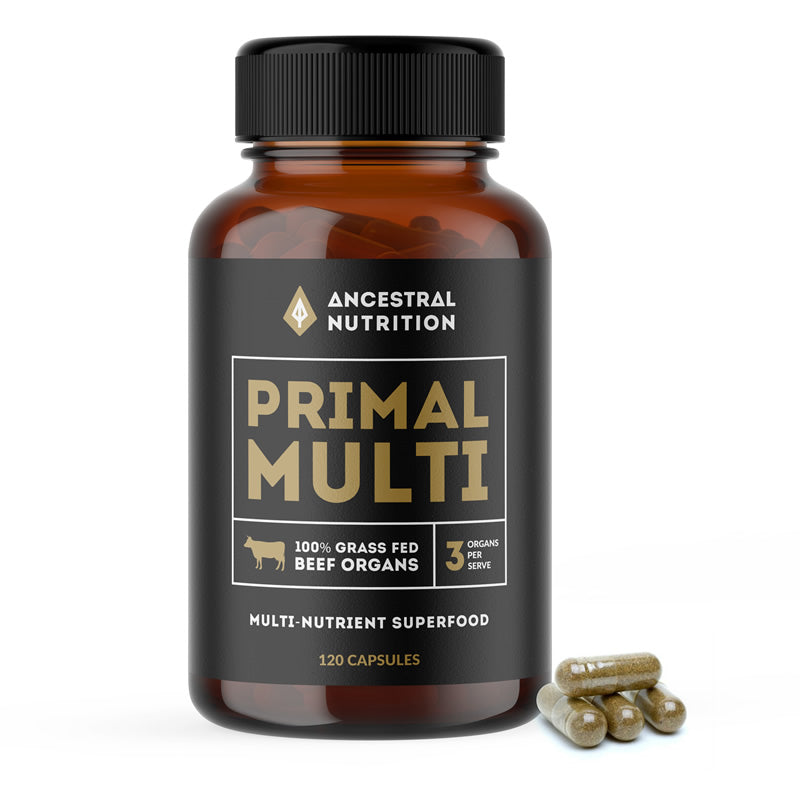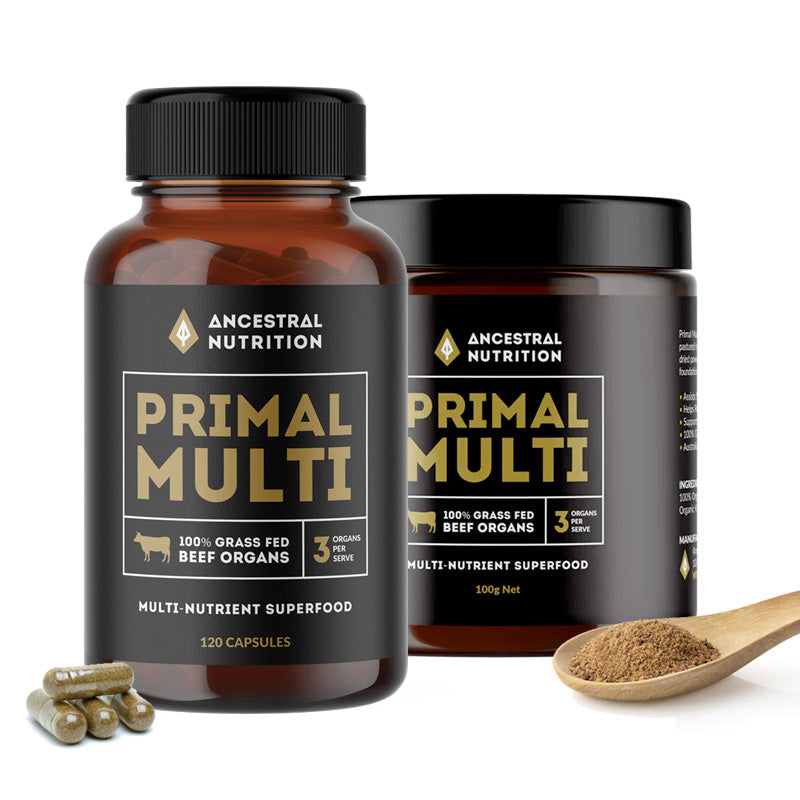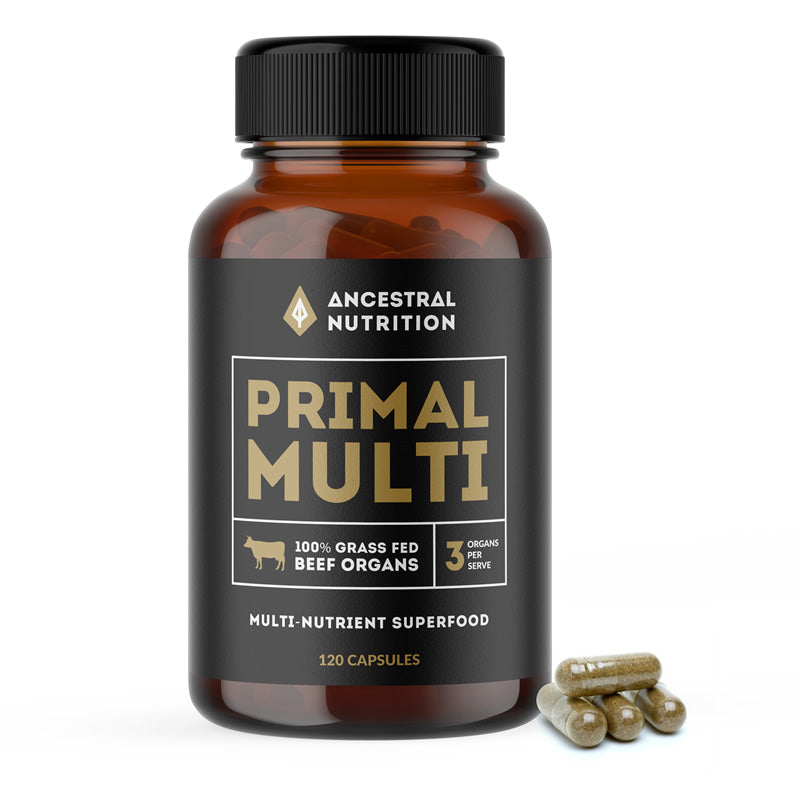
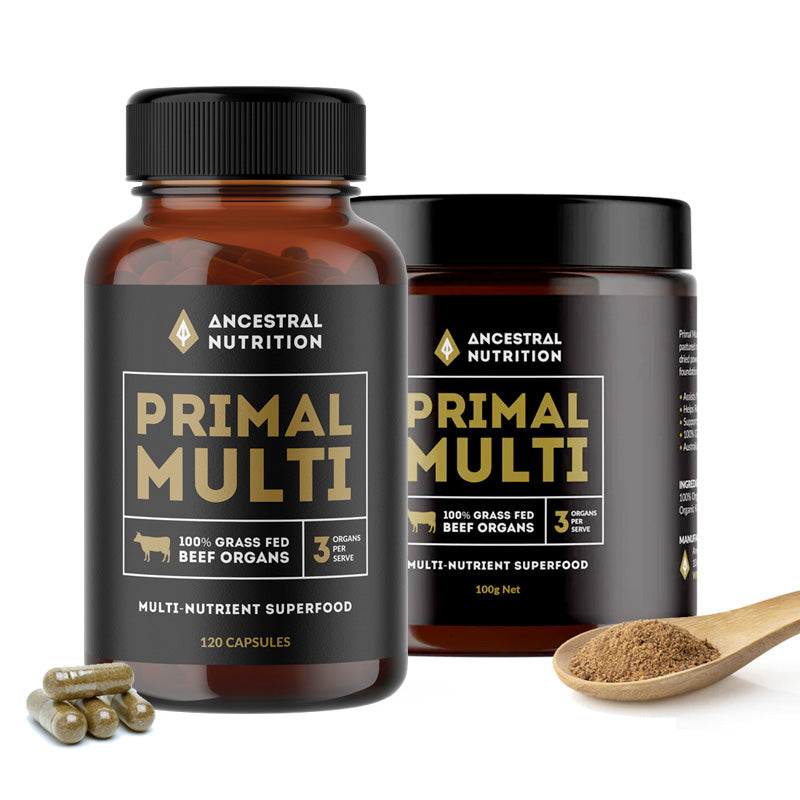






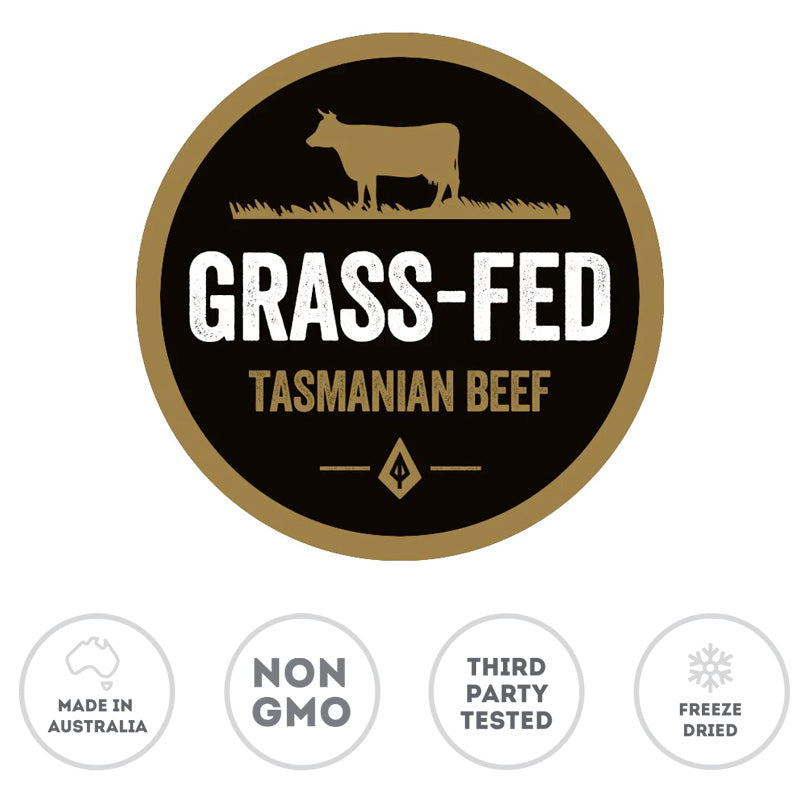



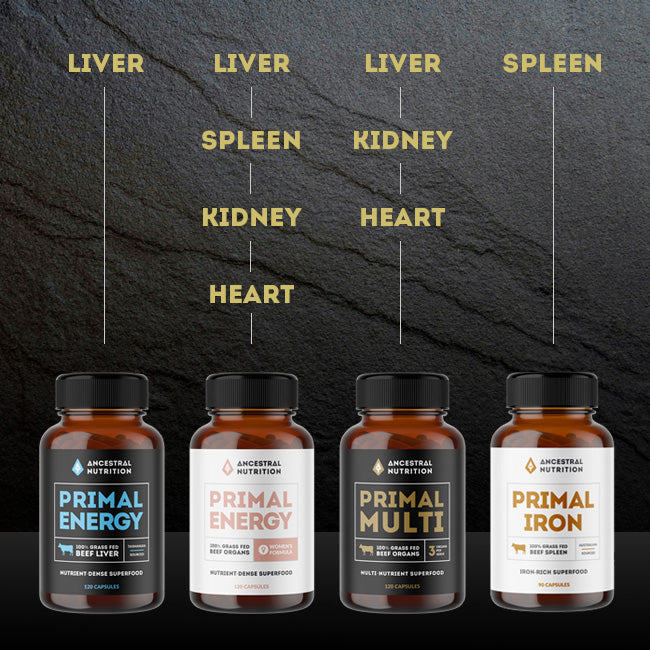
-

Nature's Multivitamin
Beef organs are nature’s multivitamin, packed with essential nutrients to nourish and energise you.
-

Liver, Kidney & Heart
The powerful combination of liver, kidney, and heart provides a nutrient-rich boost for overall vitality and well-being.
-

Naturally Sourced
Beef organs provide superior, bioavailable nutrients that your body can easily absorb and use for lasting health.
Real Reviews From Real People
Primal Multi Beef Organ Capsules & Powder FAQs
What Nutrients Are Naturally Found in Beef Organ Supplements?
Primal Multi: Wholefood Support from Nature’s Most Nutrient-Rich Organs
Primal Multi is a simple, powerful blend of three essential beef organs — liver, heart, and kidney — each freeze-dried to preserve their natural nutrients. Designed to support whole-body vitality, this formula delivers key vitamins, minerals, and co-factors in a form your body can recognise and absorb — with no synthetic additives, just real food.
What’s Inside:
- Liver – nature’s multivitamin, a source of vitamin A (as retinol), iron, B12, folate, and copper
- Heart – provides naturally occurring CoQ10, known for its role in cellular energy metabolism
- Kidney – a source of selenium and vitamin B12, supporting antioxidant activity and immune function
- Trace Minerals – zinc and copper, naturally present, contribute to metabolic and immune health
- Peptides & Enzymes – unique to each organ, retained through gentle freeze-drying
Sourced from 100% grass-fed, grass-finished Tasmanian cattle, Primal Multi offers nutrient-dense, traditional nourishment in convenient capsule or powder form — no fillers, just wholefood organ support.
How Do Beef Organ Supplements Taste?
Beef organ supplements are available in both capsule and powder form — and the taste experience can vary depending on which you choose.
- Capsules: Most people find beef organ capsules virtually tasteless. They’re an easy and convenient way to get the benefits of organ meats without the flavour. Simply swallow with water, just like any other supplement.
- Powder: Freeze-dried beef organ powder has a rich, earthy flavour that’s true to its natural source. While some people enjoy the taste in savoury blends, others prefer to mix it into smoothies, broths, or sauces to mask the flavour.
Whether you choose capsules or powder, beef spleen is valued more for its nutrient density than its taste. Tip: If you're sensitive to taste, capsules are the most neutral option.
When Is the Best Time to Take Beef Organ Supplements?
Beef organ supplements can be taken at any time of day, but many people prefer to take them in the morning or with their first meal to support daily nutrient intake and energy metabolism.
Because beef organs are naturally rich in vitamin B12, iron, and other energising nutrients, taking it earlier in the day may help align with your body’s natural rhythm and avoid any potential for overstimulation at night.
Tips for Best Results:
- With food: Taking beef organs with/after a meal may help improve absorption.
- Consistency matters: Regular daily use is more important than timing — choose a time that fits your routine.
- Start slow: If you're new to beef organs, begin with a smaller dose and gradually increase as tolerated.
Beef organ supplements are a wholefood source of nutrients, not synthetic isolates — making them suitable for long-term daily support.
How Long Does It Take to Notice the Effects of Beef Organ Supplements?
The timeline for noticing the benefits of beef organ supplements can vary from person to person. It often depends on your current iron and B12 status, dietary habits, and overall lifestyle.
Because beef organs are a natural source of heme iron, vitamin B12, and supportive trace minerals like zinc and copper, some individuals may feel a shift in energy, stamina, or general wellbeing within a few weeks. For others, it may take longer as the body gradually rebuilds nutrient stores.
Factors That May Influence Your Experience:
- Nutrient status: If you're not getting enough iron or B12 from food, you may notice changes sooner.
- Consistency: Whether you use capsules or powder, taking your supplement daily is key.
- Overall diet: Pairing beef organs with a nutrient-dense, wholefood diet may support better outcomes.
As with any wholefood supplement, beef organs work best when taken consistently over time as part of a balanced approach to wellbeing — not as a quick fix.
Are Your Beef Organ Products Free From Bovaer® Feed Additives?
Yes — our beef organ products are sourced from 100% grass-fed and grass-finished, pasture-raised Tasmanian cattle that are not supplemented with Bovaer® or other synthetic feed additives.
We work closely with local farms that focus on natural, traditional grazing practices. This ensures the purity of our products while maintaining full transparency across the supply chain — from paddock to capsule.
No hormones, no antibiotics, no synthetic feed additives — just real food the way nature intended.
Do You Sell Certified Organic Organs?
We often get this question — but the truth is, certified organic organs simply don’t meet our standards for nutritional density, animal welfare, or sustainability. Here’s why:
1. Animal Welfare:
Most Australian organic cattle are raised in arid central regions where only drought-tolerant breeds can survive. These harsh conditions often lead to stressed animals, which can negatively affect organ quality. In contrast, our cattle are raised on lush, rotational pastures in temperate climates.
2. Nutrient Quality:
Certified “Organic” doesn’t guarantee nutrient density. Many organic farms use broad-spectrum fertilisers without soil-specific analysis. We work with trained agronomists who test and manage soil health to maximise nutrient uptake in grasses — and ultimately in the organs.
3. Sustainability:
To meet organic certification, some producers use unsustainable inputs like prawn meal scraped from ocean floors — cheap, compliant, but ecologically harmful. Our approach focuses on true regenerative practices, not certification checkboxes.
We don’t chase labels. We chase results. Learn more on our quality page here.
Can I Use Beef Organ Supplements While Pregnant?
Beef organs are a natural source of important nutrients like heme iron, vitamin B12, zinc, and selenium — all of which play supportive roles during pregnancy. These nutrients are present in their wholefood form, making beef organs a valuable addition to a nutrient-dense diet for some women.
As always, we recommend consulting your healthcare provider before adding beef organ supplements to your routine during pregnancy, to ensure they align with your individual dietary needs and prenatal care plan.
Wholefood organ supplements like beef organs can offer nutritional value — but every pregnancy is different, and personalised advice is best.
How Are Your Beef Organ Supplements Made?
Our beef organ supplements are made using a careful, low-temperature freeze-drying process that preserves the natural integrity of the nutrients — without the use of heat, additives, or synthetic preservatives.
Here’s how we do it:
Step-by-Step Production Process:
- 1. Sourced Locally: We use 100% grass-fed & grass-finished, pasture-raised beef organs from Tasmanian farms that meet strict animal welfare and food safety standards.
- 2. Fresh Processing: The organs are trimmed, gently cleaned, and frozen shortly after harvest to maintain freshness and nutrient quality.
- 3. Freeze-Dried for Potency: Through sublimation, moisture is removed at low temperatures to preserve heat-sensitive vitamins like B12 and folate.
- 4. Milled and Encapsulated (or Powdered): The dried organs are finely ground and packed into capsules or jars — with no binders, fillers, or flow agents.
- 5. Packed in Our Byron Bay Facility: We manufacture in-house to maintain full control over quality and consistency, from raw ingredient to finished product.
Every batch is third-party tested for safety and packaged in our purpose-built Byron Bay facility — ensuring transparency, traceability, and trust.
What’s the Difference Between Beef Organ Capsules and Powder?
Both capsules and powder deliver the same core benefits of beef organs — but differ in format, convenience, and flexibility, depending on your lifestyle and preferences.
Beef Organ Capsules:
- Pre-measured and easy to take
- No taste or smell — ideal if you’re sensitive to flavour
- Great for travel or daily routines
- Offers consistent dosage (e.g. 2g = 4 capsules)
Beef Organ Powder:
- Versatile for adding to food (e.g. smoothies, bone broth, patties)
- Slightly more economical per gram
- Mild organ flavour — best for those who are comfortable with natural tastes
- Allows flexible dosing for families or pets
Whether you prefer convenience or culinary creativity, both formats provide the same freeze-dried, nutrient-dense organs — sourced from grass-fed & grass-finished Australian cattle and made without additives or fillers.
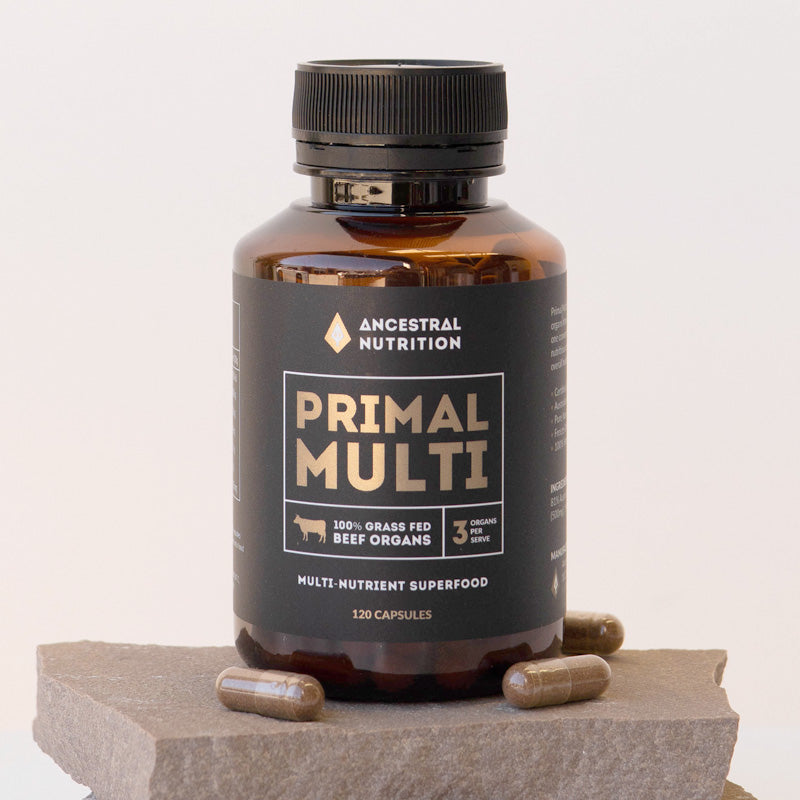
Nutrient-Rich Wholefood Support
Each serve of our beef organ blend provides a wide range of essential nutrients naturally found in liver, kidney and heart — including vitamin A (as retinol), vitamin B12, folate, heme iron, riboflavin, copper, choline, and CoQ10. These wholefood nutrients play important roles in supporting energy, vitality, and overall wellbeing.
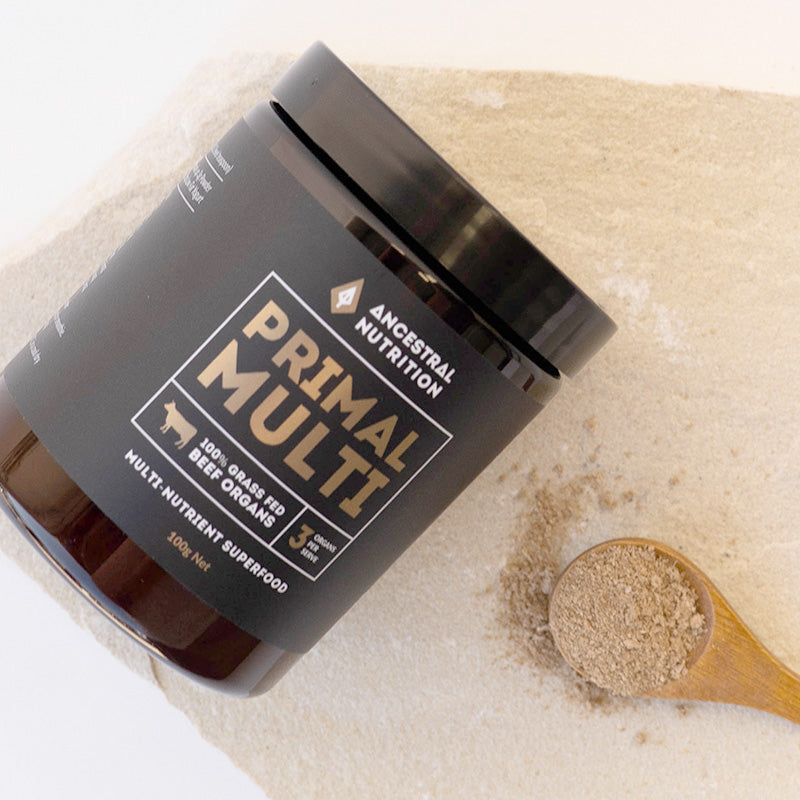
264% RDI Vitamin B12 per 3g Serve
Vitamin B12 Benefits:
- Helps Reduce Tiredness & Fatigue
- Assists Healthy Iron Metabolism
- Supports Normal Immune System Function

Grown in Tasmania. Crafted in Byron Bay.
We use certified grass-fed and grass-finished beef liver from Tasmanian farmers. It's freeze-dried in small batches and packed in our Byron Bay facility to retain its natural nutrient profile.
Third-party batch tested for quality.

Benefits of Daily Use
- Assists Immune System Function
- Helps Reduce Tiredness & Fatigue
- Supports Cell Protection From Free Radicals
- Overall Health & Wellbeing
Primal Multi Additional Information
Why Organ Meats Deserve a Place on Your Plate
For generations, organ meats like beef liver, kidney, and heart were cherished for their role in traditional diets. These cuts were once common kitchen staples—not just for their flavour, but for the wide range of nutrients they offer.
Today, organ meats are making a comeback—and for good reason.
Nutrient-Rich by Nature
Organ meats are known for their dense nutritional content. Compared to typical muscle meats, they offer a broad spectrum of nutrients, including:
- B vitamins such as B12, riboflavin (B2), and folate
- Minerals like iron, zinc, phosphorus, and selenium
- Fat-soluble vitamins including vitamin A (retinol)
In particular, liver is widely recognised as a rich source of vitamin A and B12, while heart and kidney also contain a range of essential micronutrients.
Supporting a Balanced Diet
These nutrient-dense foods complement a whole food diet and may help you meet your daily intake of key vitamins and minerals, especially if you're looking for variety beyond muscle meats. Organ meats are also a natural source of high-quality protein, which is essential for tissue repair, enzyme function, and general wellbeing.
More Than Just Liver
- Beef liver is known for its vitamin A content and also provides iron, B12, and copper.
- Beef kidney contains selenium and B vitamins and is often included in traditional cuisines.
- Beef heart, although a muscle, contains B12 and iron, as well as naturally occurring CoQ10—a compound involved in cellular energy metabolism.
Incorporating Organ Meats
Not everyone enjoys the taste or texture of fresh organ meats, and that’s okay. Freeze-dried organ supplements offer a practical option for those looking to include these foods in their diet more conveniently.
Beef Organs and Immune Function: A Nutritional Perspective
Good nutrition plays an important role in supporting the body's natural defences. While lifestyle factors like sleep, stress, and physical activity all contribute, food is a daily opportunity to nourish the body with key vitamins and minerals.
Beef organs such as liver, heart, and kidney are some of the most nutrient-dense whole foods available. They provide a broad spectrum of essential nutrients that are involved in normal immune system function, as recognised by national nutrition guidelines.
Nutrients Found in Beef Organs
- Vitamin A – Found abundantly in liver, vitamin A is necessary for the maintenance of mucous membranes and epithelial tissues, which act as a physical barrier in the body. It also plays a role in the normal function of the immune system.
- B Vitamins – Including B12, riboflavin, and folate, which are involved in cellular processes such as energy metabolism and the production of red blood cells. These nutrients contribute to normal immune system function.
- Iron and Copper – Present in many organ meats, these minerals contribute to normal immune system function and oxygen transport in the body.
- Zinc and Selenium – Found in kidney and liver, these minerals act as cofactors for antioxidant enzymes that help protect cells from oxidative stress.
- Coenzyme Q10 – Naturally present in heart tissue, this compound plays a role in energy production at the cellular level.
Whole Foods as Part of a Balanced Diet
Including a variety of whole foods such as meats, seafood, vegetables, and organ meats can support overall wellbeing. Organ meats are traditionally valued for their density of essential vitamins and minerals in a relatively small serving size.
For those who prefer convenience or do not regularly prepare fresh organ meats, freeze-dried forms may offer an alternative way to include these foods in the diet.
Important Considerations
- Nutritional needs vary by age, sex, and life stage.
- Individuals with specific health conditions or dietary restrictions should consult a healthcare practitioner before making changes to their diet.
- Beef organs are a food source and should not be relied upon as a sole method of supporting the immune system.
Kidneys: A Naturally Nutritious Organ Meat
Kidneys have been valued in traditional diets for generations due to their rich nutrient profile. Naturally high in protein and packed with essential vitamins and minerals, beef kidney offers a unique addition to a whole-food, animal-based approach to eating.
Nutritional Highlights of Kidney
A 100-gram serving of beef kidney provides around 20 grams of protein, along with a variety of important micronutrients that support overall health and wellbeing:
- Vitamin B2 (Riboflavin): Supports energy production by helping to convert food into fuel.
- Vitamin B12 & Folate: Contribute to normal neurological function and red blood cell formation.
- Iron: Helps transport oxygen throughout the body and contributes to normal energy levels.
- Zinc: Plays a role in immune function, skin repair, and healthy metabolism.
- Selenium: Aids in protecting cells from oxidative stress and supports thyroid function.
- Vitamin A: Contributes to the maintenance of healthy skin and mucous membranes.
- Copper: Supports connective tissue structure and helps with iron transport.
- Vitamin K2: Involved in calcium metabolism and plays a role in maintaining bone health.
Adding Kidney to Your Diet
Beef kidney can be pan-fried, stewed, or blended into traditional recipes for a nutrient-rich boost. However, if you find cooking with organ meats challenging, freeze-dried kidney in capsule or powder form may offer a convenient way to include these nutrients in your routine—especially when sourced from 100% grass-fed and grass-finished cattle.
The Top 4 Reasons People Choose to Eat Beef Heart
Honouring a Nutrient-Rich Tradition
Beef organs have been part of traditional diets for generations. Among them, beef heart stands out for its impressive nutritional profile. Below, we explore four reasons why beef heart continues to be valued as a whole food option in modern ancestral diets.
1. Naturally Contains Key Nutrients
Beef heart is a source of essential nutrients such as iron and zinc. These minerals support various biological functions in the body, including helping to transport oxygen and playing a role in enzyme activity.
It also contains a wide range of B vitamins, including:
- Vitamin B1 (Thiamine) – supports energy production.
- Vitamin B2 (Riboflavin) – contributes to normal cell function.
- Vitamin B3 (Niacin) – helps the body release energy from food.
- Vitamin B5 (Pantothenic Acid) – plays a role in normal metabolism.
- Vitamin B12 – supports red blood cell formation.
- Choline – a nutrient that contributes to healthy cell structure and function.
2. A Whole Food Source of Protein
Beef heart is a source of natural protein, which contributes to the growth and maintenance of muscle mass. Including organ meats in a varied diet can be one way to obtain high-quality protein from whole foods.
3. Contains Coenzyme Q10 (CoQ10)
Beef heart is known to contain Coenzyme Q10, a compound found in the mitochondria of cells. CoQ10 is involved in the body's energy pathways and is naturally present in various organ meats, especially the heart.
4. Includes Collagen and Elastin
As a muscle meat, beef heart contains connective tissue proteins such as collagen and elastin. These structural proteins are found in the body's skin, tendons, and ligaments and help form part of the body’s natural framework.
At Ancestral Nutrition, we make traditionally valued organ meats—like beef heart—accessible in convenient capsule and powder form. All products are 100% grass-fed, grass-finished, and sourced from Australian cattle.
Disclaimer
The information presented on this page is provided for general educational purposes only and is not intended to diagnose, treat, cure, or prevent any disease. Statements about Primal Multi — Grass-Fed Beef Organs and other Ancestral Nutrition products have not been evaluated by the Therapeutic Goods Administration (TGA). These products are sold as foods/dietary supplements and are regulated under the Australia New Zealand Food Standards Code; they are not registered therapeutic goods.
Individual nutrient requirements vary. Always read the label, follow directions for use, and check the Nutrition Information Panel for serving size and daily intake guidance. If you are pregnant, nursing, under 18 years of age, have a known medical condition, or are taking prescription medication, consult a qualified healthcare professional before using any new food or supplement.
Testimonials and customer stories reflect personal experiences and may not be typical; results can differ from person to person. Ancestral Nutrition makes no guarantee of specific outcomes.
By continuing to browse or purchase from this site, you acknowledge that you have read and understood this disclaimer and agree to use the information and products responsibly and in conjunction with professional medical advice where appropriate.

